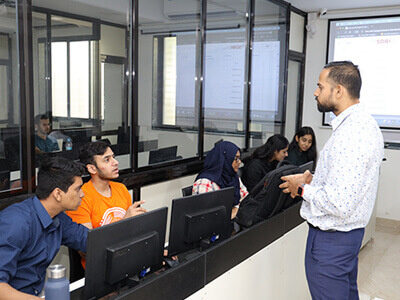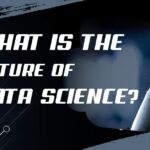
Bachelors
Bachelors in Data Science and Business Analytics is a 3 years full-time undergraduate course that facilitates one to learn technical skills and practical insight to Data Science. The aim is to teach students how to Implement algorithms for fundamental data science tasks such as machine learning and data mining, statistical inference etc, using a high-level language which is suitable for data science
The program combines theory and practice to enable graduates of the program to meet the demands of the data-driven economy of the future.
The program aims at
- Enabling students to apply theory and methodologies of several data science-oriented topics in statistics and computing to solve problems in real-world contexts.
- Providing students with data management and machine learning skills to design and implement reliable solutions for data-oriented problems.
- Providing students with a strong sense of social commitment, global vision and independent self-learning ability.
Key highlights

University of Mumbai
Globally recognised degree from the prestigious 160 years old University of Mumbai. Campus placed at renowned Patkar-Varde college having ‘A+ Grade’ by NAAC.

Industry Experts
Faculties from industry and academia provide a perfect amalgamation of theory and real-life case studies for analyzing and extracting insight from data.

Learning Management System
Revisit, rethink and revise lectures through a Virtual Campus making learning experiences much simpler, interactive and personalized.

100% Placement Assistance
The placement cell has been set up to guide students to communicate technical ideas effectively, help them in resume building and assist them with job placement.
Programming softwares / tools covered
Training Methodology
“Knowledge is of no value unless you put it into practice and practice is never possible without a deep knowledge”
Classroom Learning
Theory
Theory subjects like Statistics, Data structures, machine learning and time series lead to a deeper understanding of a concept through seeing it in context of a greater whole and understanding the why behind it.
Practical
Practical learning of tools like Python, SQL and Power BI provides hand on to be able to communicate technical ideas effectively through both programming and data visualisation tools.

Application Based Learning

Industry connects
These guest lectures are delivered by experienced professionals from the industry to provide insights of the work-life and ground realities of real-world challenges to keep students informed about the latest happenings in the Industry.
Case studies
Working on case studies gives hands-on experience to solve real-world problems and sharpen skills. They are an important step in a student journey to become data fluent and help them build their data science portfolio.
Experience based Learning
Internships
Internships are a way to build one’s résumé, get experience and build connections helping students to be more well-rounded and increase their breadth of knowledge and experience when joining the workforce full-time.
Projects
Project based learning is a non-traditional education model that structures curriculum around discrete projects, presenting students with multi-step problems to solve and use multiple learning techniques including research, logical deduction, and iterative learning.

Eligibility Criteria
Open for students of all streams (Science/Commerce/Arts) who have a keen interest in statistics, programming and data analysis to develop a business acumen.
There are 2 ways to become eligible for this course:
Option A
Cleared class 12 Examination (HSC or it’s equivalent) with 75% and above.
Option B
Cleared Quantitative Aptitude Test (QAT) and Personal Interview round.
Course Syllabus
This semester introduces students to the basics of statistical analysis and programming tools to learn how to apply theory and methodologies of several data science-oriented topics in mathematics, statistics and computing to solve problems in real-world contexts.
Paper title
- Basics of object-oriented programming
- Linear Algebra and Basics of Calculus
- Probability and Statistics
- Excel Analytics
- Introduction to Python Programming
| Semester I | |||
|---|---|---|---|
| Course Code | Course Type | Course Title | Credits |
| PUSDSBA101T/P | Core Subject-Practical | Basics of object-oriented programming | 2 |
| PUSDSBA102T | Core Subject | Linear Algebra and Basics of Calculus | 2 |
| PUSDSBA103T | Core Subject | Probability and Statistics | 4 |
| PUSDSBA104T | Core Subject | Excel Analytics | 4 |
| PUSDSBA105T | Core Subject | Introduction to Python Programming | 4 |
| Total Credits | 20 | ||
This semester includes inferential statistics along with data base management providing students with the technical and analytical skills required for acquiring, managing, analyzing and extracting insight from data using R, Python and VBA.
Paper title
- Inferential Statistics
- Data Structures
- Database Management System – DBMS
- Introduction to R Programming
- Application of Statistics using Python
- Automation and Products in Excel – VBA
| Semester II | |||
|---|---|---|---|
| Course Code | Course Type | Course Title | Credits |
| PUSDSBA 201 | Core Subject | Inferential statistics with Python | 2 |
| PUSDSBA 2P1 | Core Subject-Practical | Inferential statistics with Python - Practical | 2 |
| PUSDSBA 202 | Core Subject | DBMS – Database management system | 2 |
| PUSDSBA 2P2 | Core Subject-Practical | DBMS – Database management system - Practical | 2 |
| PUSDSBA 203 | Core Subject | Data Structures | 4 |
| PUSDSBA 204 | Core Subject | Introduction to R Programming | 4 |
| PUSDSBA 205 | Core Subject | Automation and Products in Excel | 4 |
| Total Credits | 20 | ||
This semester introduces forecasting using time series,data visualization and apply inference procedures to analyze big data using HADOOP to interpret and communicate results via data visualisation tools like Power BI.
Paper title
- Design and Analysis of Algorithm
- Algorithms in R and Python
- Fundamentals of Operating Systems
- Time Series Analysis
- Data Visualization using Power BI
- Big Data Architecture and Ecosystem
| Semester III | |||
|---|---|---|---|
| Course Code | Course Type | Course Title | Credits |
| PUSDSBA 301 | Core Subject | Design and Analysis of Algorithms | 4 |
| PUSDSBA 302 | Core Subject | Fundamentals of Operating Systems | 2 |
| PUSDSBA 3P2 | Core Subject-Practical | Fundamentals of Operating Systems- Practical | 2 |
| PUSDSBA 303 | Core Subject | Time Series analysis | 2 |
| PUSDSBA 3P3 | Core Subject-Practical | Time Series analysis – Practical | 2 |
| PUSDSBA 304 | Core Subject | Big Data architecture and ecosystem | 2 |
| PUSDSBA 3P4 | Core Subject-Practical | Big Data architecture and ecosystem – Practical | 2 |
| PUSDSBA 305 | Core Subject | Data Visualization– (Using Power BI) | 4 |
| Total Credits | 20 | ||
This semester introduces basics of ML, data mining to clean, transform and query data, data security enabling students to assess the level of privacy and security of a technical solution to a data science problem.
Paper title
- Fundamentals of Pattern Recognition
- Pattern Recognition in R and Python
- Data Security
- Distributed Processing using HADOOP
- Data Mining and Warehousing
- Web and Social Media Analytics
| Semester IV | |||
|---|---|---|---|
| Course Code | Course Type | Course Title | Credits |
| PUSDSBA 401 | Core Subject | Fundamentals of Pattern Recognition | 2 |
| PUSDSBA 4P1 | Core Subject-Practical | Fundamentals of Pattern Recognition - Practical | 2 |
| PUSDSBA 402 | core Subject | Distributed Processing using HADOOP | 2 |
| PUSDSBA 4P2 | Core Subject-Practical | Distributed Processing using HADOOP – Practical | 2 |
| PUSDSBA 403 | Core Subject | Web and Social Media Analytics | 2 |
| PUSDSBA 4P3 | Core Subject-Practical | Web and Social Media Analytics – Practical | 2 |
| PUSDSBA 404 | Core Subject | Data Mining and Warehousing | 4 |
| PUSDSBA 405 | Core Subject | Business Communication | 4 |
| Total Credits | 20 | ||
Implement algorithms for fundamental data science tasks such as machine learning and next-generation databases using a high-level language which is suitable for data science.
Paper title
- Machine Learning
- Machine Learning in R and Python
- Next Generation Databases
- Image and Video Analytics
- Internship
| Semester V | |||
|---|---|---|---|
| Course Code | Course Type | Course Title | Credits |
| PUSDSBA 501 | Core Subject | Machine Learning | 2 |
| PUSDSBA 5P1 | Core Subject-Practical | Machine learning in R and Python | 2 |
| PUSDSBA 502 | core Subject | Next Generation Databases | 2 |
| PUSDSBA 5P2 | Core Subject-Practical | Next Generation Databases - Practical | 2 |
| PUSDSBA 503 | Core Subject | Image and Video Analytics | 4 |
| PUSDSBA 504 | Core Subject-Practical | Latest trends in Internet technology | 4 |
| PUSDSBA 505 | Core Subject | Internship | 4 |
| Total Credits | 20 | ||
In this semester students learn to apply contemporary computing technologies, such as Internet Of Things, Artificial Intelligence,Cloud Computing, to solve practical problems characterized by big data.
Paper title
- Introduction to Cloud Computing
- Latest Trends in Internet Technologies
- Application using Apache Spark and Scala
- Business Communication
- Business Intelligence Reporting
- Project work – Electives
- Financial Analytics
- Marketing Analytics
| Semester VI | |||
|---|---|---|---|
| Course Code | Course Type | Course Title | Credits |
| PUSDSBA 601 | Core Subject | Introduction to Cloud Computing | 2 |
| PUSDSBA 6P1 | Core Subject-Practical | Introduction to Cloud Computing - Practical | 2 |
| PUSDSBA 602 | core Subject | Apache and Scala | 2 |
| PUSDSBA 6P2 | Core Subject-Practical | Apache and Scala Practical | 2 |
| PUSDSBA 603 | Core Subject | NLP | 2 |
| PUSDSBA 6P3 | Core Subject-Practical | NLP Practical | 2 |
| PUSDSBA 604 | Core Subject | Information Governance & Data Analysis | 4 |
| PUSDSBA 605 | Core Subject | Project Work-Elective 1. Financial Analytics 2. Marketing Analytics | 4 |
| Total Credits | 20 | ||
















